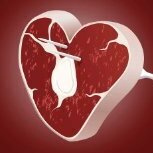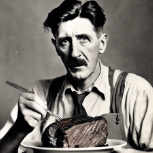-
Welcome to our Carnivore / Ketovore / Keto Online Community!
Welcome to Carnivore Talk! An online community of people who have discovered the benefits of an carnviore-centric ketogenic diet with the goal of losing weight, optimizing their health, and supporting and encouraging one another. We warmly welcome you! [Read More]
Vegetarians At 50% Higher Risk Of Hip Fracture
-
Similar Content
-
- 15 comments
- 116 views
-
Jesus was NOT a vegan - Behind the Christspiracy! [Video/Podcast]
By Bob,
- vegan
- vegetarian
- (and 1 more)
- 15 replies
- 177 views
-
- 6 replies
- 422 views
-
- 8 replies
- 770 views
-
- 0 comments
- 295 views
-
-
Our picks
-

What is your favorite way to eat/prepare eggs?
Bob posted a topic in Carnivore, Meat-based Keto, & Ketovore Support,
Vote for your favorite way to prepare eggs!
-
- 19 replies

Picked By
Bob, -
-

This Month's Giveaway
Carnivore Talk posted a topic in Site News, Suggestions, & Support ,
Enter to win! We're giving away a copy of The Carnivore Diet by Shawn Baker or The Carnivore Code by Paul Saladino.-
- 1 reply

Picked By
Carnivore Talk, -
-

Carnivore Talk Credits - What Are They? How to Earn them...
Carnivore Talk posted a topic in Site News, Suggestions, & Support ,
Carnivore Talk Credits - Earn rewards for posting!-
- 0 replies

Picked By
Carnivore Talk, -
-

White or Dark meat?
Qapla posted a topic in Carnivore, Meat-based Keto, & Ketovore Support,
Vote on your favorite type of poultry!
-
- 29 replies

Picked By
Bob, -
-

How do you like your steak?
Bob posted a topic in Carnivore, Meat-based Keto, & Ketovore Support,
Vote for your favorite way to cook a steak!-
- 4 replies

Picked By
Bob, -
-






Recommended Posts
Join the conversation
You can post now and register later. If you have an account, sign in now to post with your account.
Note: Your post will require moderator approval before it will be visible.